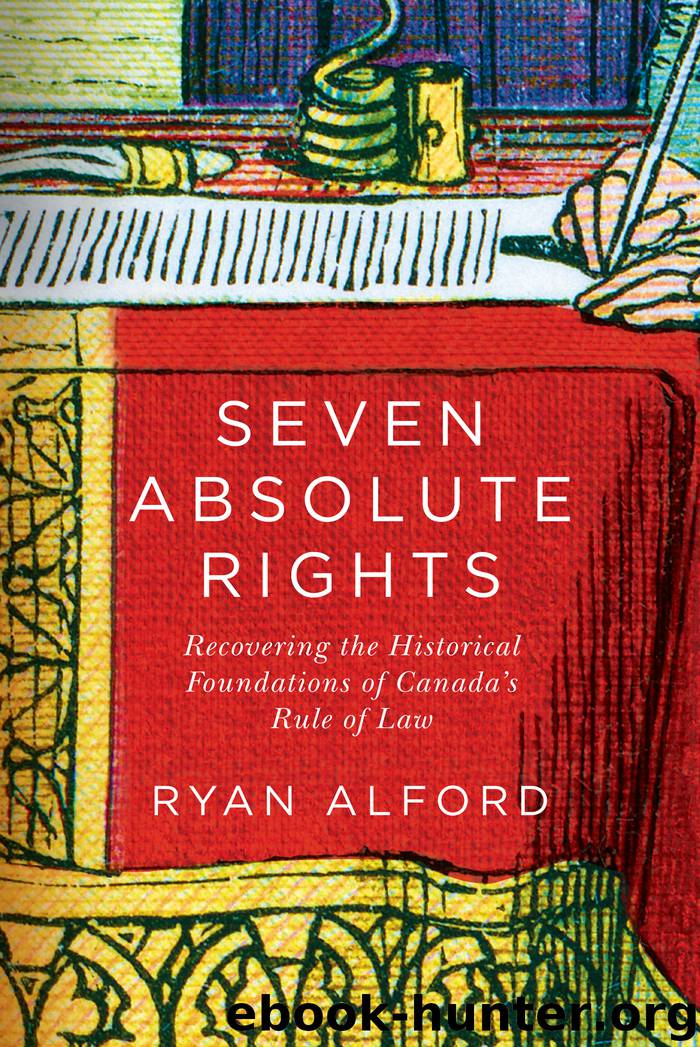Seven Absolute Rights by Ryan Alford

Author:Ryan Alford
Language: eng
Format: epub
Publisher: MQUP
Published: 2020-05-14T16:00:00+00:00
PART THREE
Transplanting the Rule of Law: Bending in New Winds of Change
PREFACE TO PART III
The framers’ understanding of the British constitution and its importance to the preservation of rights, rather than merely as a framework for government, was the product of the colonial history of British North America; as was the case with every constitutional statute discussed to date, it reflected a settlement that was implemented after the resolution of a constitutional crisis. In this case, the essential historical backdrop to the constitutional statute (here, the Constitution Act, 1867) is the constitutional crises that occurred during the struggle for responsible government. These began with the rebellions of 1837–38 and ended with the passage of the Rebellion Losses Bill (Lower Canada), 1849.
The victory of the Great Ministry of Louis-Hippolyte LaFontaine and Robert Baldwin in 1849 was over the Family Compact, the oligarchy famously described by Lord Durham, then governor general, as “a petty corrupt insolent Tory clique.” This victory is well known for implementing responsible government and toppling an oligarchy, but it achieved far more than that. In much the same manner as those who brought about the Glorious Revolution in England, the moderate reformers in Canada managed to preserve and magnify the importance of all of the substantive constitutional principles of the rule of law, especially the guarantees of due process created by Magna Carta, the protections of the English Bill of Rights, the bar on prolonged arbitrary detention found in the Habeas Corpus Act, and the provision of an independent judiciary created by the Act of Settlement.
In essence, the history of the rule of law in British North America was a recapitulation of its development over the previous two centuries in England. Many of the first English settlers came to escape the religious persecution of the early Stuart kings, who frequently subjected them to extraconstitutional punishment in the prerogative courts. For example, dissenters were frequently pilloried (and sometimes mutilated) for failing to take the Oath ex Officio in the Court of High Commission and to confirm they had taken communion in the manner required by the Church of England, the state religion. Many of these forms of persecution were eliminated by the Act Abolishing the Star Chamber. However, these burgeoning colonies were deprived of the benefits of the constitutional settlement of the Glorious Revolution, which allowed for continued arbitrary governance by the imperial authorities that recalled the worst excesses of the Stuart eras.
After the American Revolution, the governors in what remained of British North America enshrined the British constitution at the heart of the new political order, but this purportedly faithful imitation was hollow at its core: the constitutional principles of the rule of law did not constrain the colonial governments in any way, especially during emergencies. Roughly a decade before the triumph of responsible government, the governments of Upper and Lower Canada responded to rebellions by imposing martial law, subjecting even moderate and constitutionalist opponents of the oligarchical regimes to prolonged arbitrary detention, treason trials before corrupt judges (or at drumhead tribunals), and cruel and unusual punishments.
Download
This site does not store any files on its server. We only index and link to content provided by other sites. Please contact the content providers to delete copyright contents if any and email us, we'll remove relevant links or contents immediately.
Day by Elie Wiesel(2786)
The Age of Genius by A. C. Grayling(2592)
Gideon's Spies: The Secret History of the Mossad by Gordon Thomas(2355)
The Gulag Archipelago (Vintage Classics) by Aleksandr Solzhenitsyn(2106)
FATWA: Hunted in America by Pamela Geller(2013)
Columbine by Dave Cullen(1870)
Men Explain Things to Me by Rebecca Solnit(1729)
The Rule of Law by Bingham Tom(1701)
Anatomy of Injustice by Raymond Bonner(1671)
Examples & Explanations: Administrative Law by William F. Funk & Richard H. Seamon(1649)
Three Cups of Tea by Greg Mortenson(1620)
The Source by James A. Michener(1619)
That Every Man Be Armed by Stephen P. Halbrook(1584)
ADHD on Trial by Michael Gordon(1581)
Future Design by Unknown(1580)
Gideon's Spies by Gordon Thomas(1512)
Palestinian Walks by Raja Shehadeh(1499)
Constitutional Theory by Carl Schmitt(1458)
Nothing to Envy by Barbara Demick(1451)
